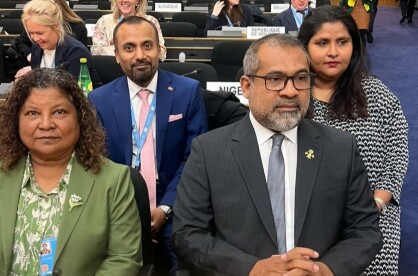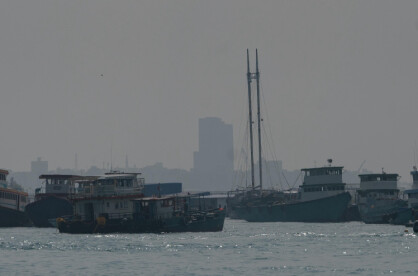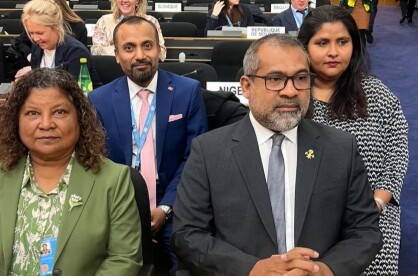The Malé City disconnect
The City Council seems increasingly disconnected from the "on the ground" reality of Malé residents, throwing a spanner into the agency's projects outlook.

The City Council seems increasingly disconnected from the "on the ground" reality of Malé residents, throwing a spanner into the agency's projects outlook.

Discussing Malé City feels almost like an enigmatic tennis match. On one hand, the severity of the congestion is undeniable, with traffic a constant conundrum and the detrimental disparity of living standards even within singular neighbourhoods, compared with the high economic flow through the city and the concentration of services and amenities which compare unfairly with the rest of the nation.
Recently the Malé City Council set out to adopt a more democratic approach in fixing the broken system in terms of infrastructure by conducting open public town hall meetings. Their intention was to outline the general situation, alongside statistics of the administrative work they had done thus far, yet the feedback was not what they had expected. Having made it very clear in the invitation as well as constant reminders throughout the meeting that the public was invited to suggest solutions strictly within the confines of the ward being represented, they were instead faced with a barrage of complaints and grievances.
For anyone keeping abreast of the social issues in the city, this would come as no surprise.
A member of MFR attended one such meeting in hopes of clearing the air on upcoming projects and to get a feel of the mindset of the people towards progress, yet the takeaway was something entirely different. It was clear that there were a few major points that needed to be addressed before suggesting solutions would even be viable for the people. These points always kept looping around to the main theme of housing and standard of living.
Many members of the public voiced out how they had spent their entire lives in the city, diligently working at keeping the large wheels and cogs of society turning in numerous fields, yet the attention they deserved was not being given. To be fair, the current City Council consisted of members newly elected to their posts earlier in June, so for them to shoulder the burden of fixing the status quo was quite a challenge already.
The other major issues that were brought up were calling for more equitable treatment when distributing social housing opportunities, and also the land inheritance of the permanent residents in the city. Since generation after generation had been living on the same plot of land, distribution of the inheritance was becoming nigh impossible, ending up with plots that were inhumanely small, according to residents. Truly such claims needed a proper survey to gather information, yet it seemed like this was an issue faced by quite a majority of the attendees.
Further issues regarding standard of living gravitated towards the lack of amenities in the neighbourhoods. The issue of lack of open spaces, including the tight scheduling of the Raalhugandu Park, was repeatedly brought up, with people citing the days of old when picnics and outdoor play was common place for families. These opportunities were restricted now, with the many ‘developments’ made to the infrastructure slowly suffocating the residents of their tertiary needs, and it was certainly an issue that fell within the mandates of the local Council.
The issue of parking was brought up quite a number of times as well. This was obviously one of the biggest issues faced, but the Council confirmed the fears of the people that there was no known restriction on the import of more vehicles into the already congested streets. Their plans were more towards adjusting the roads to allow more space for pedestrians, including removal of parking spaces in the smaller streets and creating pedestrian zones in others, yet the problem that propped up at the heels of this solution was the lack of proper alternatives.
Residents were the ones suffering from the actions of the few, yet parking was an issue perpetuated by and suffered by the people as well. Without proper alternatives to parking spaces already in place, such drastic measures could only further deteriorate the standards of living. The Council, however, promised alternatives yet the meetings were intended to gather such ideas and opinions, so when were the alternatives going to be implemented? Who would conduct the necessary studies to ensure these alternatives were adequate?
Another member of the public raised the issue of the current parking spaces being sorely inadequate as they were built only with a single ground floor. The suggestion was to increase the surface area by building parking facilities with multiple floors, and this was answered by the Council in a way that bellied their attitude towards most of the issues faced so far.
The Mayor answered that the ground-floor only parking on large plots of land was to provide an immediate solution to the larger problem. He also claimed that budget was an issue they had to contend with, which begs the question; as such a vital part of administrative governance, why is the City Council affected by restricted access to taxpayer funds, taxpayers who were constantly demanding and, during the meetings, begging for infrastructure reform?
We hope our readers will keep following this story as it unfolds, as we continue to work towards the heart of the matter, to measure if this city council administration truly intends to improve the city for its people, or to slap a bandage on the issues under the pretence of lack of funds.



